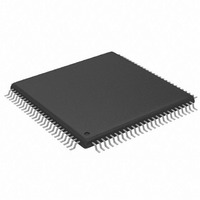PIC18F97J60-I/PF Microchip Technology, PIC18F97J60-I/PF Datasheet - Page 200

PIC18F97J60-I/PF
Manufacturer Part Number
PIC18F97J60-I/PF
Description
IC PIC MCU FLASH 65KX16 100TQFP
Manufacturer
Microchip Technology
Series
PIC® 18Fr
Datasheets
1.PIC16F616T-ISL.pdf
(8 pages)
2.PIC18F66J65-IPT.pdf
(8 pages)
3.PIC18F66J65-IPT.pdf
(480 pages)
4.PIC18F66J65-IPT.pdf
(4 pages)
5.PIC18F66J65-IPT.pdf
(10 pages)
6.PIC18F96J60-IPT.pdf
(24 pages)
7.PIC18F97J60-IPF.pdf
(472 pages)
Specifications of PIC18F97J60-I/PF
Program Memory Type
FLASH
Program Memory Size
128KB (64K x 16)
Package / Case
100-TQFP, 100-VQFP
Core Processor
PIC
Core Size
8-Bit
Speed
41.667MHz
Connectivity
EBI/EMI, Ethernet, I²C, SPI, UART/USART
Peripherals
Brown-out Detect/Reset, POR, PWM, WDT
Number Of I /o
70
Ram Size
3808 x 8
Voltage - Supply (vcc/vdd)
2 V ~ 3.6 V
Data Converters
A/D 16x10b
Oscillator Type
Internal
Operating Temperature
-40°C ~ 85°C
Processor Series
PIC18F
Core
PIC
Data Bus Width
8 bit
Data Ram Size
3808 B
Interface Type
Display Driver/Ethernet/EUSART/I2C/MSSP/SPI
Maximum Clock Frequency
41.667 MHz
Number Of Programmable I/os
70
Number Of Timers
5
Operating Supply Voltage
2.35 V to 3.6 V
Maximum Operating Temperature
+ 85 C
Mounting Style
SMD/SMT
3rd Party Development Tools
52715-96, 52716-328, 52717-734, 52712-325, EWPIC18
Development Tools By Supplier
PG164130, DV164035, DV244005, DV164005, PG164120, DV164136, DM183033
Minimum Operating Temperature
- 40 C
On-chip Adc
16-ch x 10-bit
Package
100TQFP
Device Core
PIC
Family Name
PIC18
Maximum Speed
41.667 MHz
Lead Free Status / RoHS Status
Lead free / RoHS Compliant
For Use With
AC162064 - HEADER INTFC MPLABICD2 64/80/100DM163024 - BOARD DEMO PICDEM.NET 2
Eeprom Size
-
Lead Free Status / Rohs Status
Lead free / RoHS Compliant
Available stocks
Company
Part Number
Manufacturer
Quantity
Price
Company:
Part Number:
PIC18F97J60-I/PF
Manufacturer:
MICRRCHIP
Quantity:
1 800
Company:
Part Number:
PIC18F97J60-I/PF
Manufacturer:
Microchip Technology
Quantity:
10 000
Part Number:
PIC18F97J60-I/PF
Manufacturer:
MICROCHI
Quantity:
20 000
- PIC16F616T-ISL PDF datasheet
- PIC18F66J65-IPT PDF datasheet #2
- PIC18F66J65-IPT PDF datasheet #3
- PIC18F66J65-IPT PDF datasheet #4
- PIC18F66J65-IPT PDF datasheet #5
- PIC18F96J60-IPT PDF datasheet #6
- PIC18F97J60-IPF PDF datasheet #7
- Current page: 200 of 472
- Download datasheet (8Mb)
PIC18F97J60 FAMILY
FIGURE 17-7:
17.4.5.1
In the Full-Bridge Output mode, the P1M1 bit in the
CCP1CON register allows users to control the forward/
reverse direction. When the application firmware
changes this direction control bit, the module will
assume the new direction on the next PWM cycle.
Just before the end of the current PWM period, the
modulated outputs (P1B and P1D) are placed in their
inactive state, while the unmodulated outputs (P1A and
P1C) are switched to drive in the opposite direction.
This occurs in a time interval of (4 T
Prescale Value) before the next PWM period begins.
The Timer2 prescaler will be either 1, 4 or 16, depend-
ing on the value of the T2CKPS bits (T2CON<1:0>).
During the interval from the switch of the unmodulated
outputs to the beginning of the next period, the
modulated outputs (P1B and P1D) remain inactive.
This relationship is shown in Figure 17-8.
Note that in Full-Bridge Output mode, the ECCP1 mod-
ule does not provide any dead-band delay. In general,
since only one output is modulated at all times,
dead-band delay is not required. However, there is a
situation where a dead-band delay might be required.
This situation occurs when both of the following
conditions are true:
DS39762B-page 198
PIC18F97J60
Direction Change in Full-Bridge Mode
P1A
P1B
P1C
P1D
EXAMPLE OF FULL-BRIDGE APPLICATION
OSC
* (Timer2
FET
Driver
FET
Driver
Preliminary
QA
QB
1.
2.
Figure 17-9 shows an example where the PWM direc-
tion changes from forward to reverse at a near 100%
duty cycle. At time t1, the outputs, P1A and P1D,
become inactive, while output, P1C, becomes active. In
this example, since the turn-off time of the power
devices is longer than the turn-on time, a shoot-through
current may flow through power devices, QC and QD
(see Figure 17-7), for the duration of ‘t’. The same
phenomenon will occur to power devices, QA and QB,
for PWM direction change from reverse to forward.
If changing PWM direction at high duty cycle is required
for an application, one of the following requirements
must be met:
1.
2.
Other options to prevent shoot-through current may
exist.
The direction of the PWM output changes when
the duty cycle of the output is at or near 100%.
The turn-off time of the power switch, including
the power device and driver circuit, is greater
than the turn-on time.
Reduce PWM for a PWM period before
changing directions.
Use switch drivers that can drive the switches off
faster than they can drive them on.
Load
V+
V-
QC
QD
© 2006 Microchip Technology Inc.
FET
Driver
FET
Driver
Related parts for PIC18F97J60-I/PF
Image
Part Number
Description
Manufacturer
Datasheet
Request
R

Part Number:
Description:
Manufacturer:
Microchip Technology Inc.
Datasheet:

Part Number:
Description:
Manufacturer:
Microchip Technology Inc.
Datasheet:

Part Number:
Description:
Manufacturer:
Microchip Technology Inc.
Datasheet:

Part Number:
Description:
Manufacturer:
Microchip Technology Inc.
Datasheet:

Part Number:
Description:
Manufacturer:
Microchip Technology Inc.
Datasheet:

Part Number:
Description:
Manufacturer:
Microchip Technology Inc.
Datasheet:

Part Number:
Description:
Manufacturer:
Microchip Technology Inc.
Datasheet:

Part Number:
Description:
Manufacturer:
Microchip Technology Inc.
Datasheet:











